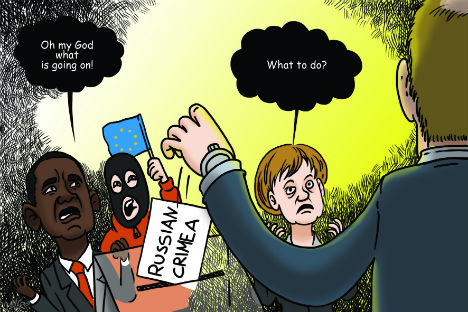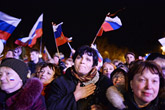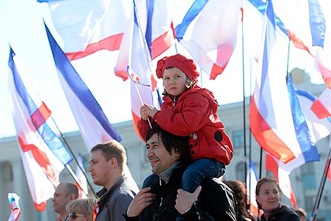Behind the reunification of Crimea with Russia

Source: Konstantin Maler
The reunification (or annexation – the definition depends on your political bias) of Crimea is a result of some twenty-odd years of relations between Russia and the United States. I don’t mention Europe, because it is a geographical rather than a political entity. There was a time when it dreamt of a unified Constitution of the United States of Europe, able to compete with the U.S. and China, but those dreams have remained dreams.
When the Soviet Union passed into oblivion, it became clear, though not formally recognized that Russia lost the Cold War and America had won it. And it was expected that the losing party would behave exactly as it is appropriate for the loser, that it would soon adhere to the Western rules of the game and would be receptive to the Western mentality and would quietly grow, but would never reach its bygone power. Alas, these expectations did not come true. Russia was not receptive either to the Western values, or to the Western mentality. Not because it remained in captivity of its Soviet past, but due to a much more serious reason – Russia’s origins lie in the Eastern, Byzantine Christianity, unlike in the West, which goes back to Rome, to the Western Christianity. There is an abyss between these two mentalities and values. This is the first reason.
Second, Russia started to get up from its knees faster than it was expected, which was greatly assisted by unexpectedly high oil prices. Well, and third, it quickly became clear that Russia was not going to behave like a defeated country. The first sign of this was the conflict over NATO’s decision to bomb Yugoslavia, to which Russia loudly objected. And we have to keep in mind that neither the Security Council, nor the EU gave its consent to these bombings. The U.S decided to do it – and the U.S. did it, saying to Russia, “we’ll manage things without you” (and I shall note that the violent secession of Kosovo from Serbia, recognized by the West, has opened a Pandora’s Box no matter who and what is being said on this occasion). If we start from this event and trace further, we will see a whole bunch of disagreements between the U.S. and Russia, where the United States has always acted from the position of strength. Both sides grew irritated: the first because the latter did not behave “as it is appropriate”, while the second – because the former was not taking it seriously, clearly referring to it as to a second-rate country.
During all this time, the U.S. tried, and sometimes successfully, to squeeze Russia out of those regions, which it had traditionally considered its sphere of influence: this was the Caucasus and Central Asia, the Middle East and Eastern Europe. Russia had no answer to this (read: forces), although the extremely skillful use of American mistakes allowed it to dramatically boost its ratings in the Arab world (Syria), and not only (Iran). However, what Russia could not tolerate under any circumstances was the U.S.’s desire to take its place in Ukraine. And this was not just because of the fear that such a Ukraine would join NATO, whose armed forces would be at the southwestern borders of Russia. It was (and is) a matter of a deep psychological belief that Ukraine is “ours” and that the Ukrainians are “our people.” Try to imagine for a moment that a revolution occurs in Mexico, a new leader comes to power and invites Russia to place part of its armed forces along the Mexican-American border. Have you imagined it? Do you see the consequences?
Meanwhile, the processes taking place in Ukraine were increasingly undermining the country. It started under Kravchuk’s rule and continued under Kuchma. Yushchenko’s coming to power was not a salvation for Ukraine, it rather plunged the country into chaos. In the following presidential election, Yushchenko received only 5 percent of the votes. It is clear that the election of Yanukovych was the result of a protest vote. Under his rule, the statehood of Ukraine actually approached zero, corruption had reached such a level that, in comparison with it, Russian corruption seems to be child’s play. Popular discontent had been growing stronger and stronger, but...
All this was taken by the Russian leadership as a new confirmation of what had been constantly happening over the last twenty years: the West has been pushing for its solutions, actually refusing (not in actual words) to take into account Russia’s interests – in this case in a region, which for centuries was part of the so-called “Russian World”. Only a strongly limited person could think that there would be no reply. And there it was. I do not exclude the possibility that this is what they counted on, to take advantage of it, and to some extent return back to the psychological state of the Cold War. I do not say it is exactly this way, but I do not exclude it – Putin was starting to play a prominent role, being recognized as “the most influential politician of the year”, “man of the year”, etc.
What about Crimea? Do I need to remind you that, strictly speaking, Crimea has never been part of Ukraine? The Presidium of the Supreme Council, which had to approve Khrushchev’s decision on the transfer of Crimea from the RSFSR to the Ukrainian SSR, voted for it with just 13 votes. The Presidium consisted of 27 people, so there was no quorum, as the other 14 were simply not present). However, this is not a matter of legal pettifogging. It is a matter of a decision – that any negotiations with the West are meaningless, and it is time to make it clear to them that they cannot treat the national interests of Russia in this way. And the fact that Crimea (not to mention Sevastopol) historically and ethically belongs to Russia, that the inhabitants of Crimea overwhelmingly orient towards Russia, is perfectly clear. And so the decision was made.
Then we can talk about the “pros” and “cons”. However, I insist that such discussions should be based on knowledge and sober understanding of what existed, and exists.
The incredible activity of the West in everything that is happening does not have anything to do with the desire to protect human rights in Ukraine, nothing to do with the concern for preserving the integrity of Ukraine. This is all about the geopolitical strategic interests. And Russia’s actions, in my opinion, are not dictated by the desire to “protect the Russians, the Ukrainians and Crimean Tatars”, but are rather dictated by the same reasons: geopolitical and national interests.
First published in Russian in Pozneronline.ru.
All rights reserved by Rossiyskaya Gazeta.
Subscribe
to our newsletter!
Get the week's best stories straight to your inbox

